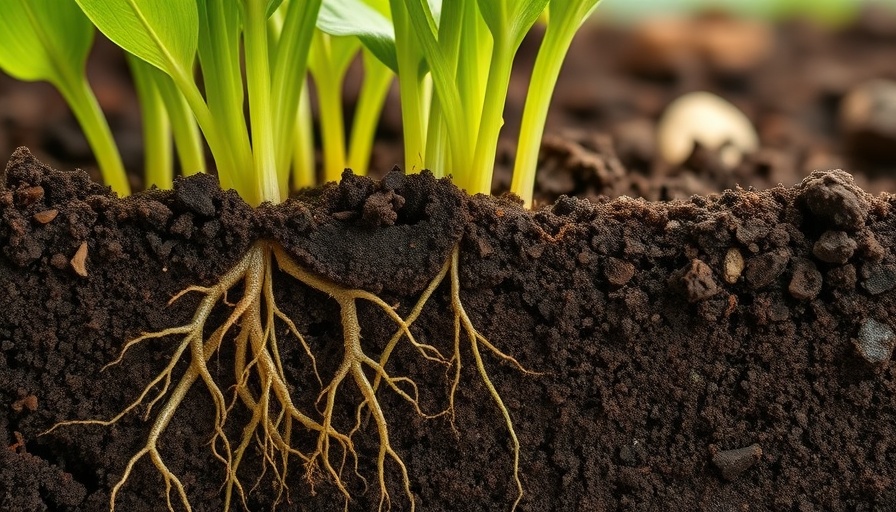
Transforming Dirt into a Thriving Ecosystem: The Power of Soil Inoculants
When we think of soil, the image of mere dirt often comes to mind. However, beneath its surface lies an intricate ecosystem teeming with life. Just a teaspoon of healthy soil can harbor billions of microorganisms, including fungi, bacteria, and countless insects, all working together to support plant life. For urban and suburban homeowners, understanding the significance of this underground world is paramount for nurturing healthier gardens and growing vegetables.
Why Soil Health Matters for Your Garden
A flourishing garden begins with good soil health. Happy soil means happier plants, which means more bountiful harvests. Healthy soil plays a significant role in:
- Improved moisture retention: Healthy soil can hold water more effectively, reducing the need for frequent irrigation.
- Reduced soil erosion: Soil composed of aggregates rather than individual particles is less vulnerable to being washed away or blown by the wind.
- Enhanced nutrient absorption: Nutrient-rich soil helps plants efficiently absorb the essential elements they need to thrive.
- Protection against pathogens and pests: A diverse microbial population acts as natural defenders against harmful insects and diseases.
The Role of Soil Inoculants: How to Foster Soil Health
Enhancing soil health starts with soil inoculation—introducing beneficial microbes and organisms into the soil. These soil inoculants can revolutionize how your garden performs. Mycorrhizae, for example, form symbiotic relationships with plant roots, improving nutrient and water uptake. Similarly, nitrogen-fixing organisms can enhance soil fertility by converting nitrogen from the air into a form accessible to plants.
To effectively utilize soil inoculants, you can:
- Incorporate compost: Mixing compost into soil boosts microbial diversity.
- Employ cover crops: Planting cover crops between growing seasons enriches the soil with organic matter and provides habitat for beneficial microbes.
- Choose the right inoculants: Depending on your gardening goals, choose appropriate inoculants such as biopesticides, nutrient-solubilizing microbes, or plant growth hormone producers.
Creating a Thriving Rhizosphere
The rhizosphere is an active zone of interaction between plant roots and soil organisms. This environment is critical for plant health, as beneficial microbes can enhance root growth and function. Incorporating soil inoculants not only enriches your garden's nutrient levels but also bolsters the populations of microbes vital for disease resistance.
The Future of Gardening: Innovations in Soil Health
As urban gardening continues to gain popularity, new soil inoculants and methods are emerging within the gardening community. Research is being conducted to identify strategies that feed the microbiome, creating an environment where plants can thrive while reducing reliance on synthetic fertilizers. Techniques such as no-till gardening and using biofertilizers are paving the way for healthier soil ecosystems.
Practical Tips for Home Gardeners
1. Start with **testing your soil** to understand its needs and deficiencies. 2. Utilize **cover crops** like clover or vetch during off-seasons to promote nutrient cycling and improve soil structure. 3. Experiment with various types of **soil inoculants**, starting small to see how your garden responds. 4. Implement **crop rotations** to prevent soil depletion and maintain a balanced ecosystem. By alternating the types of plants you grow, you can improve overall soil health, making your garden more resilient against pests.
Turning Knowledge into Action: Your Gardening Journey
Now is the time to transform your relationship with your garden. Embrace the idea that soil is not just dirt, but a vibrant habitat for life. By incorporating soil inoculants and investing in your garden’s health, you’re setting yourself up for success as you grow vegetables and cultivate your urban green space. Whether you’re just starting with DIY gardening projects or you’re looking to refine your techniques in fruit tree care or shade gardening, these practices are essential for sustainable living.
As you navigate your gardening journey, remember the invaluable connection you’re forging with the earth. We can all do our part to improve soil health, benefiting not only our gardens but also contributing to a healthier planet.
Ready to cultivate a healthier garden? Start incorporating soil inoculants today and watch your garden flourish!
 Add Row
Add Row  Add
Add 




 Add Row
Add Row  Add
Add 

Write A Comment